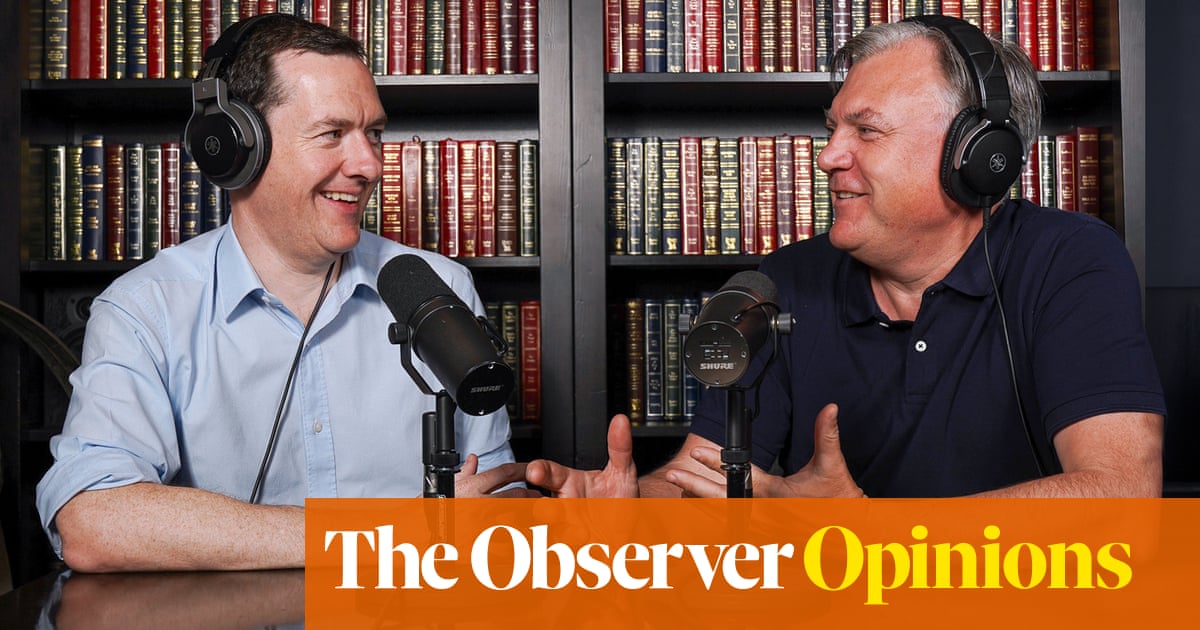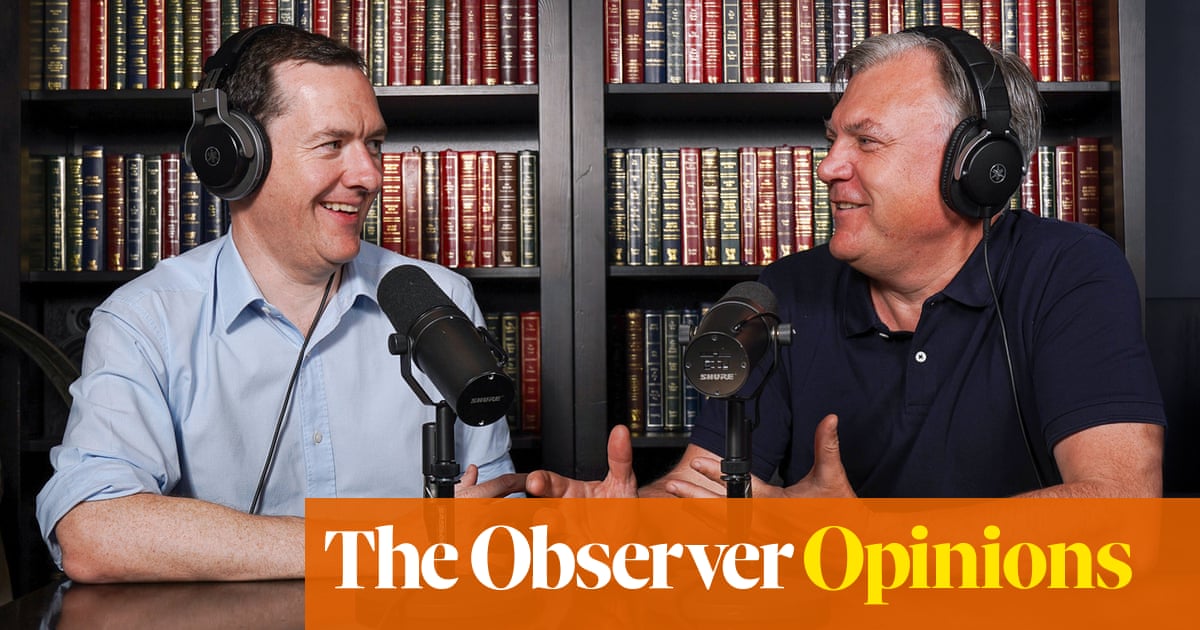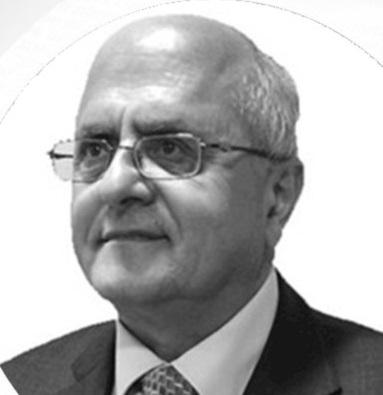
Even for non-attendees, George Osborne’s July wedding lingers in the memory. First, because of the bizarre, orange confetti protest. Second, because of the number of journalists who were guests.
Nick Robinson from Today. Emily Maitlis and Jon Sopel, formerly of the BBC, now presenting the News Agents podcast. Sky’s former political editor, Adam Boulton. Ed Balls, the former Labour minister, now a daytime TV presenter. Times Radio’s Mariella Frostrup. Almost enough to show Osborne in a decent light. Do such guests hint at personal qualities that might, if they’d been visible, make up for his reputation as one of Britain’s worst ever chancellors? Perhaps an endearing side to Osborne finally helps account for his chairmanship, as an arts-axer, of the British Museum, for his editorship, as a non-journalist, of a newspaper, and now, for the warm interest in his new podcasting career.
To know the real Osborne is, perhaps, to forget his ugly remarks on benefit receivers, his strafing of public services, his hope of finding Theresa May “chopped up in bags in my freezer”. Yes, it sounded bad, but if Emily Maitlis likes him?
The sudden visibility of these attendees also prompted, if only among the politically naive, less favourable conjecture: could these connections influence – have already influenced – Osborne’s media coverage? Surely not. Anyway, there would probably never be a chance to find out. Not unless Osborne was prominently interviewed by his wedding guest/s at a time when questions about his contribution to Britain’s degraded condition were unavoidable.
So if it achieved little else, the launch, last week, of Osborne’s latest platform, a podcast with Ed Balls called Political Currency, helped settle one wedding question: is it unreasonable to expect a politician’s journalist friends to either disclose the connection or recuse themselves before broadcast interviews?
Before Political Currency joined the flourishing genre of political podcasts (in which hacks or retired politicians discuss the news, usually slowing the already ponderous pace with anecdotes, “President X told me …”), lavish pre-publicity suggested the public was in for something special. Yes, it might seem like just another collaboration by two bumptious middle-aged men, but these were both former bumptious chancellors, or in Balls’s case a shadow one. “Golden political careers”, as he puts it.
Someone – maybe they’d been at the wedding – allowed the lads to film outside No 11, where Osborne said their experience would “help voters make better decisions about what’s going on”. So there is a generous side to him! We can stop worrying, should such dilemmas ever come our way, about making Osborne-scale mistakes on austerity, China, the garden bridge, the referendum, HS2, the sovereign grant and – for younger male listeners – what expression to adopt when posing with the Bullingdon Club. And look, here was someone longing for George’s thoughts. “Looking forward to the first episode,” tweeted Sadiq Khan (that unfortunate business of cancelling Osborne’s bridge evidently well behind them).
Less explicably, the Today programme was also keen to promote the latest rival to BBC podcasts. Osborne wedding guest Nick Robinson interviewed the double act. Would he, having not excused himself, mention his and Osborne’s friendship? No? Well, fair enough, here was an opportunity, with the Chinese spying story, with HS2, the British Museum and the schools and hospitals whose decaying condition is being attributed to Osborne-era austerity, for Robinson to emphasise, maybe with heightened ferocity, that BBC news presenters will always separate work from wedding obligations. After some extended chuckling among the wedding party, he sufficiently recovered his interrogative powers to ask, of the British Museum scandal, if it had got countries asking for their things back. Osborne supplied an eBay gag and that, news-wise, was that.
Anyone who enjoyed this hearty bantz will probably like Political Currency, a podcast that proved, when it finally dropped, likewise mirthful and disinclined to examine the wealthier contributor’s more regrettable choices. They began with China. Would Balls explore Osborne’s reputation as China’s useful idiot, or, with civility always in mind, the fact that, even at the time of Osborne’s “golden age” grovelling, ministers would have been aware of the security and ethical risks of a close partnership? Nope.
Rather, Balls endorsed Osborne’s pre-emptively protective position that Chinese espionage had got much worse. He similarly neglected to mention, when they turned to HS2, that even when Osborne was pressing for it, others were condemning the misdirected resources, built-in obsolescence and waste. Safe within his podcast, with Balls genially agreeing at most to differ, Osborne could advertise his doomed vanity project as an example of brave decision-making. It’s almost as if he’s interviewing for his next career move, should excessive “groupthink” render the British Museum too burdensome. “Tell us about a time you demonstrated not-listening skills in the face of informed adversity.”
He does the same when austerity is challenged, as in a podcast-promoting interview with Good Morning Britain’s Susanna Reid. “I’m proud of the decisions we took to try to fix the economy.” Did he ever think about people “cut to the quick”? “No.” Political hint: invite Susanna Reid to your wedding.
“Venerable Labour politicians who have compromised their early principles are standard stuff,” Clive James once wrote. But what possessed Ed Balls, at this relatively early stage, to join them? If he’s not unprincipled, can he not see the difficulty in, simultaneously, bragging about his political achievements and reducing them to a time-limited game? His podcast buddy backed Boris Johnson, defended Matt Hancock and still tweets for his party.
Only the most tribal sort of “never bantered with a Tory” purist would object to Balls’s Osborne infatuation or dispute the professional benefits. But a podcast in which the docile Balls helps sanitise Osborne’s reputation should self-cancel. Even if the production ensured what must have been difficult: that the attractions of the former chancellor remained, to outsiders, a mystery. Maybe next week.
Catherine Bennett is an Observer columnist












